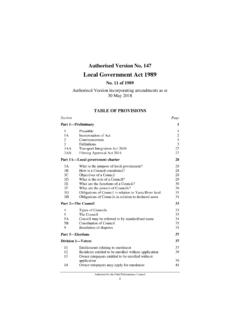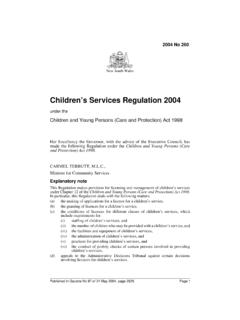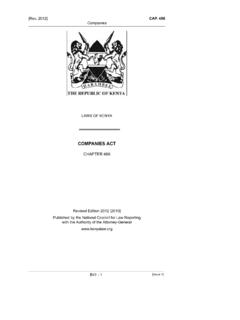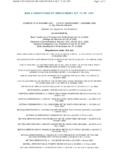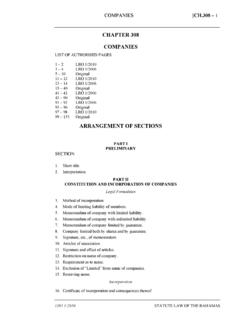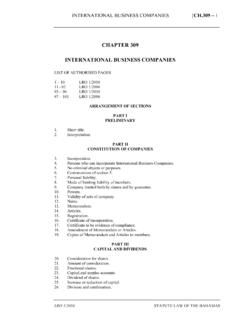Transcription of CRIMINAL LAW CONSOLIDATION (MENTAL …
1 South Australia CRIMINAL LAW CONSOLIDATION ( mental impairment ) amendment ACT 1995 No. 91 of 1995 SUMMARY OF PROVISIONS 1. Short title 2. Commencement 3. Insertion of Part SA 269A. Interpretation PART8A mental impairment D~~ONI-PREL~ARY 269B. Distribution of judicial functions between judge and jury DIVI~ON 2- mental COMPETENCE TO COMMIT OFFENCES 269C. mental competence 269D. Presumption of mental competence 269E. Reservation of question of mental competence 269F. What happens if trial judge decides to proceed first with trial of defendant's mental competence to commit offence 269G. What happens if trial judge decides to proceed first with trial of objective elements of offence D~~ON 3- mental UNFITNESS TO STAND TRIAL 269H. mental unfitness to stand trial 2691. Presumption of mental titness to stand trial 269J. Order for investigation of mental titness to stand trial 269K.
2 Preliminary prognosis of defendant's condition 269L. Trial judge's discretion about course of trial 269M. What happens if trial judge decides to proceed first with trial of defendant's mental titness to stand trial 269N. What happens if trial judge decides to proceed first with trial of objective elements of offence DIVI~ON 4-DISPO~TION OF PERSONS DECLARED TO BE LIABLE TO SUPERVISION UNDER TlDS PART 2690. Supervision orders 269P. Variation or revocation of supervision order 269Q. Report on mental condition of the defendant 269R. Report on attitudes of victims, next of kin. etc. 269S. Principle on which court is to act 269T. Matters to which court is to have regard 269U. Cancellation of release on licence 269V. Custody, supervision and care D~~ON 5-MISCELLANEOUS 269W. Counsel to have independent discretion 269X.
3 Power of court to deal with defendant before proceedings completed 269Y. Appeals 1199 No. 91 of 1995 Cri,'~ -, ---'''''_,_ ..II~-, -,.. 1 "_, -1,"_--t ") '.', BDJIL .. ~ 'y,"' :-a~' AlI8 IdIDeat Act tm 269Z. 'CouuelIiDg of IlU1 or JdD ad Yictia 2tfZA. BxcIuIiunof mdeace 269ZB. Arrest or persoa wllo escapes hID detcaliioD, ere. SCHEDlJLE 1t"_T~~ 1200 ANNO QUADRAGESIMO QUARTO ELIZABETHAE IT REGINAE ** No. 91 of 1995 An Act to amend the Crimjna. Law CODS olidation Act 1935 and to repeal the mental Health (Supplementary ProvisioDS) Act 1935. [Assented to 7 December 1995] The Parliament of South Australia enacts as follows: Short title 1. (1) This Act may be cited as the CRIMINAL Law CONSOLIDATION ( mental impairment ) amendment Act 1995. (2) The CRIMINAL lAw CONSOLIDATION Act 1935 is referred to in this. Act as "the principal Act".
4 Commencement 2. This Act will come into operation on a day to be fixed by proclamation. Insertion of Part SA 3. The following Part is inserted after Part 8 of the principal Act: Interpretation PART SA mental impairment DIVISION I-PRELIMINARY 269A. (1) In this Part-"authorised person" means a person authorised by the Minister for Health to exercise the powers of an authorised person under this Part; "judge" includes magistrate; 1201 No. 91 of 1995 CRIMINAL Law CONSOLIDATION ( mental impairment ) amendment Act 1995 " mental illness" means a pathological infirmity of the mind (including a temporary one of short duration)l; " mental impairment " includes-(a) a mental illness; or (b) an intellectual disability; or (c) a disability or impairment of the mind resulting from senility; "next of kin" of a person means a person's spouse (or putative spouse), parents and children; "objective element" of an offence means an element of an offence that is not a subjective element; "psychiatrist" means a person registered under the Medical Practitioners Act 1983 as a specialist in psychiatry; "subjective element" of an offence means voluntariness, intention, knowledge or some other mental state that is an element of the offence.
5 "supervision order" -See section 2690; "victim", in relation to an offence or conduct that would, but for the perpetrator's mental impainnent, have constituted an offence, means a person who suffered significant mental or physical injury as a direct consequence of the offence or the conduct. (2) For the purposes of this Part-(a) the question whether a person was mentally competent to commit an offence is a question of fact; (b) the question whether a person is mentally unfit to stand trial on a charge of an offence is a question of fact. 1 A condition that results from the reaction of a healthy mind to extraontinary external stimuli is not a mental illness, although such a condition may be evidence of mental iIlness if it involves some abnormality and is prone to recur (See R v Falconer (1990) 171 CLR 30).
6 Distnoution of judicial functions between judge and jury 269B. (1) An investigation under this Part by the Supreme Court or the District Court into-(a) a defendant's mental competence to commit an offence or a defendant's mental fitness to stand trial; or 1202 No. 91 of 1995 (b) CRIMINAL Law CODS06dation ( mental impairment ) amendment Act 1995 whether elements of the offence have been established, is to be conducted before a jury unless the defendant has elected to have the matter dealt with by a judge sitting alone. (2) The same jury may deal with issues arising under this Part about a defendant's mental competence to commit an offence, or fitness to stand trial, and the issues on which the defendant is to be tried, unless the trial judge thinks there are special reasons to have separate juries. (3) Any other powers or functions conferred on a court by this Part are to be exercised by the court constituted of a judge sitting alone.
7 DIVISION 2- mental COMPETENCE TO COMMIT OFFENCES mental competence 269C. A person is mentally incompetent to commit an offence if, at the time of the conduct alleged to give rise to the offence, the person is suffering from a mental impairment and, in consequence of the mental impairment -(a) does not know the nature and quality of the conduct; or (b) does not know that the conduct is wrong; or (c) is unable to control the conduct. Presumption of mental competence 269D. A person's mental competence to commit an offence is to be presumed unless the person is found, on an investigation under this Division, to have been mentally incompetent to commit the offence. Reservation of question of mental competence 269E. (1) If, on the trial of a person for an offence-(a) the defendant raises a defence of mental incompetence; or (b) the court decides, on application by the prosecution or on its own initiative, that the defendant's mental competence to commit the offence should be investigated in the interests of the proper administration of justice, the question of the defendant's mental competence to commit the offence must be separated from the remainder of the trial.
8 (2) The trial judge has a discretion to proceed first with the trial of the objective elements of the offence or with the trial of the mental competence of the defendant. (3) If, at the preliminary examination of a charge of an indictable offence, the question of the defendant's mental competence to commit the offence arises, the question must be reserved for consideration by the court of trial. 1203 No. 91 of 1995 CRIMINAL Law CONSOLIDATION ( mental impairment ) amendment Act 1995 What bappeus if trial judge decides to proceed first with trial of defendant's mental competence to commit otTence 269F. If the trial judge decides that the defendant's mental competence to commit the offence is to be tried first, the court proceeds as follows. Trial of defendant's mental competence A. (1) The court-(a) must hear relevant evidence and representations put to the court by the prosecution and the defence on the question of the defendant's mental competence to commit the offence; and (b) may require the defendant to undergo an examination by a psychiatrist or other appropriate expert and require the results of the examination to be reported to the court.
9 (2) The power to require an examination and report under subsection (1)(b) may be exercised-(a) on the application of the prosecution or the defence; or (b) if the judge considers the examination and report necessary to prevent a possible miscarriage of justice-on the judge's own initiative. (3) If the court is not satisfied on the balance of probabilities that the defendant was at the time of the alleged offence mentally incompetent to commit the offence, the court must proceed with the trial of the offence in the normal way. (4) If the court is satisfied on the balance of probabilities that the defendant was at the time of the alleged offence mentally incompetent to commit the offence, the court must record a finding that the defendant was mentally incompetent to commit the offence. (5) The court may, if the prosecution and the defence agree-(a) dispense with, or terminate, an investigation into a defendant's mental competence to cenunit an offence; and (b) record a finding that the defendant was mentally incompetent to commit the offence.
10 Trial of objective elements of otTence B. (1) If the court records a finding that the defendant was mentally incompetent to commit the offence, the court must hear evidence and representations put to the court by the prosecution and the defence relevant to the question whether the court should find that the objective elements of the offence are established. (2) If the court is satisfied that the objective elements of the offence are established beyond reasonable doubt, the court must record a rmding that the objective elements of the offence are established. 1204 No. 91 of 1995 Crimjnal Law CONSOLIDATION ( mental impairment ) amendment Act 1995 (3) If the court fInds that the objective elements of the offence are established, the court must fInd the defendant not guilty of the offence but declare the defendant to be liabie to supervision under this Part; but otherwise the court must find the defendant not guilty of the offence and discharge the defendant.
